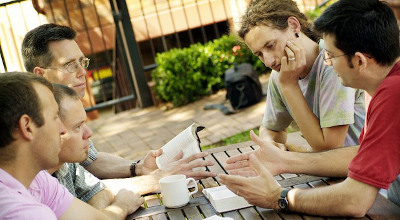
There are a number of models for gathering people. For instance, will you develop a small or large group model?
Small groups permit a closer, more relational, focus, which allows small group leaders to develop more easily. Large groups allow the focus to be on the planter who directs the programs, projects and systems. It is important to consider in the pre-launch days whether or not you intend to gather and train people in one large group or split them up into differing groups as more people become involved in the ministry.
You can either take the approach of training all the people at once or focusing on your initial leaders in order to grow the team. In other words, will you lead from the front or will you mobilize individuals to spread the workload? How you decide this will play a huge part in determining what kind of church you are going to be.
Will you meet in your home initially? This is a model that will certainly attract the middle classes, but it is a bit of a cultural no-no in schemes (however, there are always exceptions). You may get better traction by meeting in a public building which, in the schemes anyway, would mean that the locals would view you with less cult-like suspicion than in a home.
Obviously, meeting in your home keeps down costs and means less work than paying for renting a building and the hassle of packing and unpacking every week. Of course, you have to weigh up the benefits and negatives of each situation. Remember, always keep your options open on the ground.
In gathering people, it is always best to know yourself well. What kind of person are you? What kind of people are naturally drawn to you? What kind of people are you normally drawn to? These will help you understand your weak/blind spots. Whom do you need to recruit in order to achieve balance? If you are a man in your 50s, then the chances are you are unlikely to attract anybody under the age of 30.
That is a problem, and so you would need to recruit a younger team member to fill that gap. If you are only good talking to drug addicts and the unemployed, then you will need a member who can reach the more educated demographic. This is not to say that we cannot reach people outside of our own culture (God can and will use all people), but it just means that we have to be realistic when gathering in the early days because time is precious.
Talk to people. Many church planters fail to gather people simply because they fail to talk to people. If you want to figure out a balance between reading, prepping, doing newsletters and making a cool website and meeting people, then DROP EVERYTHING and meet with people. Here are some tips:
1. Go to places where people naturally congregate in your community. So, for example, is there a local cafe?
2. Join a local group with which you share some sort of affinity (then it won't be a chore but something you take great delight in).
3. Always establish contact with the extended family of new friends. Remember names and pray for them.
4. Have a good sense of humor and be able to poke fun at yourself. Humor carries so much weight in the schemes that it is practically a prerequisite for acceptance as part of our interview process.
Here is the number one tip when gathering people: Don't be a creepy, axe-murdering freak. Just chill and be normal with people. If you are awkward around people, then they will be awkward around you.
A church planter will gather people around his godliness, character, vision and likeability. You can be as godly and disciplined as you like, but if you are a social plum then you will find it difficult to gather a group around you who will take momentum into the schemes.
Mez McConnell has been the Senior Pastor of Niddrie Community Church in Edinburgh, U.K., since September 2007. Prior to that he spent four years with UFM Worldwide working with street children in Brazil, and planted the Good News Church in one of the most deprived parts of the country.
For the original article, visit churchleaders.com.
Get Spirit-filled content delivered right to your inbox! Click here to subscribe to our newsletter.
Dr. Steve Greene is now sharing stories, teachings, and conversations with guests who lead with love on Love Leads, a new podcast. Listen now.
Dr. Mark Rutland's
National Institute of Christian Leadership (NICL)
The NICL is one of the top leadership training programs in the U.S. taught by Dr. Mark Rutland. If you're the type of leader that likes to have total control over every aspect of your ministry and your future success, the NICL is right for you!
FREE NICL MINI-COURSE - Enroll for 3-hours of training from Dr. Rutland's full leadership course. Experience the NICL and decide if this training is right for you and your team.
Do you feel stuck? Do you feel like you’re not growing? Do you need help from an expert in leadership? There is no other leadership training like the NICL. Gain the leadership skills and confidence you need to lead your church, business or ministry. Get ready to accomplish all of your God-given dreams. CLICK HERE for NICL training dates and details.The NICL Online is an option for any leader with time or schedule constraints. It's also for leaders who want to expedite their training to receive advanced standing for Master Level credit hours. Work through Dr. Rutland's full training from the comfort of your home or ministry at your pace. Learn more about NICL Online. Learn more about NICL Online.


